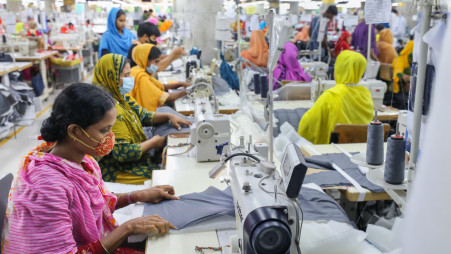The EU strategy for sustainable and circular textiles: What does it mean for Bangladesh?
Practicing sustainable and circular production is no more a choice rather an imperative for Bangladesh apparel industry to sustain its export

The European Commission has recently created a sustainable directive for textile industry by launching the EU Strategy for Sustainable and Circular Textiles. The proposed strategy will impact both consumers and companies within and outside the EU, and aims to increase transparency, sustainability, and circularity throughout the textile chain.
The Commission's strategy is formulated based on data that speaks to the environmental degradation caused by the textile industry. Currently, less than 1% of the world's textiles waste is recycled into new fibres for clothing.
Worldwide, a truckload of textiles is sent to landfills or incinerated every single second, while in Europe specifically, textile consumption has the fourth highest environmental impact after climate change, food, housing and mobility.
The textile sector is also worldwide the third highest user of water and land, and fifth highest user of primary raw materials and greenhouse gas emissions, according to the data provided in the Commission's Strategy.
So, the EU Commission's proposed strategy intends to make textiles more durable, repairable, reusable and recyclable. There are some specific measures and regulations the EU plans on implementing with the strategy, which Bangladesh as a major apparel exporter to the EU, must be aware of.
One of the measures is mandatory minimums for the inclusion of recycled fibres in textiles. By revising the Waste Framework Directive review in 2023, the EU encourages the reuse and recycling of textile waste.
The Commission also plans on introducing a Digital Product Passport for textiles; based on mandatory information requirements on circularity and other key environmental aspects.
The passport will give clearer information on apparel products to ensure consumers know the environmental impacts of their purchases (energy use, recycled content, presence of substances of concern, durability, reparability, repair score, recyclability). The EU also announced a clear and concrete pathway for the textiles industry to achieve the 2030 goals set by the Textiles Strategy.
So, apparel brands and retailers based in Europe are already making changes to be more pragmatic in sustainability and waste management strategies. Because the proposed EU Strategies also put emphasis on empowering consumers by setting up tight controls on greenwashing.
In this backdrop, practicing sustainable and circular production is no more a choice rather an imperative for Bangladesh apparel industry to sustain its export.
The EU accounts for about 60 percent of Bangladesh's total apparel export. In recent years, Bangladesh apparel industry has made commendable strides in safety and sustainability.
However, adhering to the new EU Strategies means much more to install and implement in Bangladesh's apparel industry, as far as sustainability is concerned. An explanation of these sustainability requirements will require a whole different write-up, which I would like to highlight in my next piece.
In this write-up, I intend to limit the discussion to the circularity concern. The EU strategies underscore that Bangladesh apparel industry should make the shift from linear to circular production. The pertinent question is – are we ready?
According to a research conducted by Reverse Resources, the export-oriented garment factories in Bangladesh produce an estimated 400,000 tons of textile cutting waste (known as 'jhut').
The major portion of this pre-consumer waste is currently exported to India or downcycled to low value use cases. There are only a few recycling plants in Bangladesh so far, which are insufficient to recycle the annual 400,000 tons of pre-consumer waste generated by the industry.
For promoting circularity in Bangladesh apparel industry, closing the textile loop within the country is really crucial; so, the importance of establishing more recycling centres in the country cannot be overstated.
However, the local waste collection and distribution is till now highly informal and fragmented in the country. Therefore, for smooth supply of raw materials/textile waste to the recycling plants, formalisation of this informal market is needed.
The government intervention along with the industry's willingness can ensure the formalisation of the 'jhut' market. Moreover, incentive to the apparel manufacturers provided by the government for the practice of reusing and recycling of textile waste can accelerate the momentum of circularity in Bangladesh apparel industry.
There is no doubt that adopting a circular business model is vital for our apparel sector for continuing our export to the EU and also to prepare ourselves for the upcoming changes due to LDC graduation.

Ashikur Rahman Tuhin is the Managing Director of TAD Group and a former director of Bangladesh Garment Manufacturers and Exporters Association (BGMEA).



 Keep updated, follow The Business Standard's Google news channel
Keep updated, follow The Business Standard's Google news channel
















